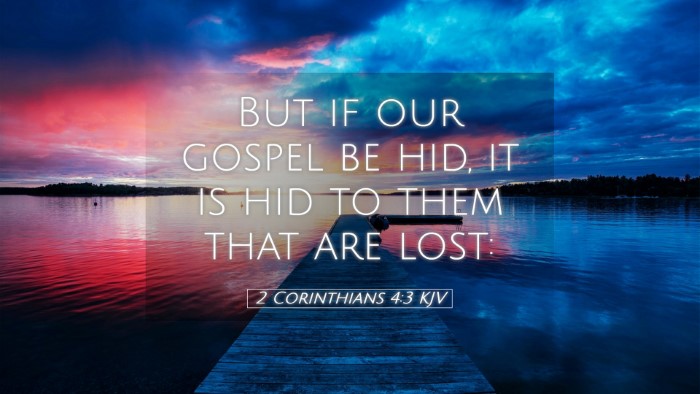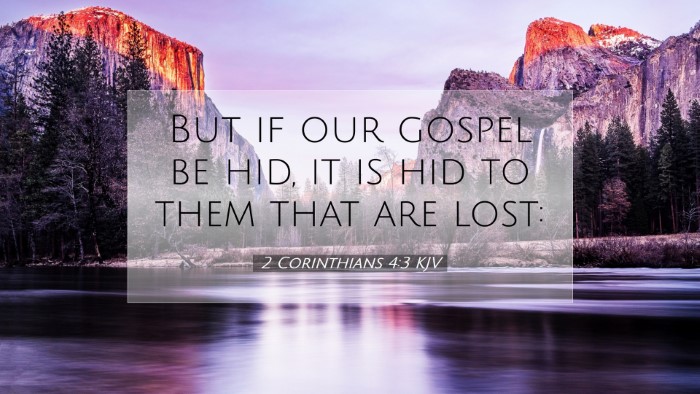Commentary on 2 Corinthians 4:3
Bible Verse: "But if our gospel be hid, it is hid to them that are lost."
Introduction
This profound statement from Paul encapsulates a key theme of his second letter to the Corinthians: the accessibility and rejection of the Gospel. When understood through the lens of public domain commentaries, the depth of meaning and historical context unfolds, revealing its significance for both the original audience and contemporary readers. Key insights from the commentaries of Matthew Henry, Albert Barnes, and Adam Clarke provide a multi-faceted understanding of the verse.
Contextual Background
The Apostle Paul wrote this letter to address various issues within the Corinthian church, including questions of authority, suffering, and the nature of true ministry. In 2 Corinthians 4:3, Paul speaks to the spiritual blindness that affects those who reject the Gospel message.
Henry emphasizes the urgency of the message, noting the stark contrast between believers who embrace the truth and those who remain lost. This blindness, according to Paul, is not merely intellectual but also moral and spiritual.
Exegesis of the Verse
Paul introduces the verse with the phrase “But if our gospel be hid…” which suggests a conditional situation. The word "hid" implies a hidden or concealed truth that not everyone perceives. Here, we delve into the interpretations of the authors:
- Matthew Henry: Henry explains that when the Gospel is hidden, it is not due to a lack of clarity but rather due to the spiritual condition of people who are "lost". These individuals are unable to see the light of the Gospel, as their hearts remain hardened.
- Albert Barnes: Barnes elaborates that this “hiding” is a result of the enemy’s work in blinding the minds of the unbelievers. He draws attention to the idea that the Gospel is a treasure, and when hidden from view, it speaks to the great loss experienced by those who refuse to believe.
- Adam Clarke: Clarke suggests that this concealment can also be a form of divine judgment. He posits that God allows certain individuals to remain in ignorance as a consequence of their rejection of truth, highlighting the severity of such a spiritual condition.
Theological Implications
This verse raises critical questions about the nature of revelation, the role of human agency, and divine sovereignty in salvation. The implications of “hid” can lead to rich theological discussions:
- Revelation of Truth: The revelation of the Gospel is a gift; when it is perceived, it brings life. Those who do not respond to it face a spiritual death, as they remain in darkness (Henry).
- Human Responsibility: While the Gospel is powerful, the responsibility lies with the hearers. Paul’s statement challenges both preachers and listeners to consider how they receive the message (Barnes).
- Divine Judgment: The spiritual blindness spoken of by Paul should invoke a sense of urgency among believers to share the Gospel actively, knowing that some may be eternally lost as a result of their inability to see the truth (Clarke).
Practical Applications for Ministry
This verse has profound implications for pastors and theologians today:
- Evangelistic Urgency: The understanding that the Gospel can be hidden from some should fuel a sense of urgency for evangelism, pushing church leaders to engage with their communities with fresh conviction.
- Prayer for Enlightenment: Recognizing the spiritual blindness of the lost necessitates a consistent prayer life focused on asking God to open eyes and soften hearts.
- Teaching Clarity: Preachers must strive to present the Gospel with clarity, knowing that the enemy seeks to blind the minds of those who hear (Barnes).
Conclusion
2 Corinthians 4:3 serves as a poignant reminder of the complexities surrounding faith, belief, and the reception of the Gospel. The insights from Henry, Barnes, and Clarke encourage deeper reflection on the nature of spiritual blindness and the imperative for the Church to proclaim the truth of Christ with unwavering commitment. For scholars and students alike, understanding this verse invites a serious consideration of how the Gospel is presented in a world often veiled in darkness.


